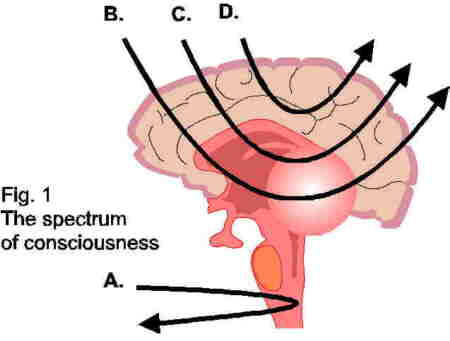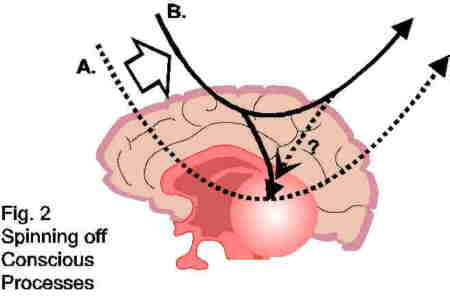Keith's Consciousness Page
Consciousness -- a few random thoughts.
Creativity is a subconscious period of increased memory association.
A song incessantly "running through your head" is attempting to
correlate/associate/memorize itself. The cure is to hear it again "for real," to
get enough input to lay down a good memory track.
"When all you have is a hammer, every problem looks like a nail."
Maybe Spiro Agnew was right. Maybe rock music really does rot
the mind. Or, more precisely, music with an incessant rapid rhythm, as well as the rapid
cognitive changes of modern-style television, "entrain" the mind into faster
cycles of thinking -- just as with "music you can't get out of your head." This
may be great for improving reaction times, but may end up with a kind of societal
attention-deficit disorder, where none of us can focus our minds on a problem for more
than three seconds.
--Keith Conover (a few random thoughts from my past that led me
to this point).
One of my major academic interests lies pretty much outside of emergency medicine. It's
the neurobiological nature of consciousness. At this point I'm mostly just trying to keep
up with what's going on in the field. But once I pay off my medical school loans, and can
cut back on the number of hours I work in the ED, I hope to be able to devote a lot of
time to the subject. I don't plan to do any research affiliated with a univerisity or
anything like that -- I'm unwilling to fritter away time with paperwork and grant
proposals and tenure "publish-or-perish" battles. But I should be able to devote
time and brainpower to the topic on my own, and who knows, maybe I'll add something to the
knowledge stores of humankind. Here is a quick summary of some of my thoughts
related to recent debates on the topic.
At this point, consider these just ramblings -- but maybe with a few interesting ideas.
I'll be fleshing this out over the next year or so into a short but coherent overview of a
unified theory of consciousness.
A unified theory of consciousness. What a difficult phrase. To define a theory
of consciousness, we must delve deeply into the question of what a theory is --
fascinating, and I'd love to bring out some Karl Popper and other quotations and discuss
the issue, but not here.
A simple approach to consciousness is as follows:
A theory of consciousness is adequate if it "explains" things in terms
acceptable to a six-year-old. (This is a shorthand way of getting around the theory of
theories.) It's an entirely empirical test -- go out and find some six-year-olds and see
if they think it's a good explanation. And remember, six year old kids don't have a long
attention span, so it better be short.
Here is a start of my list of all the things a theory of consciousness must
"explain" (remember, in six-year-old terms):
- Why do we (and other animals) have to sleep?
- Why are we sometimes absent-minded? [The theory must explain why, when I just went down
into the basement to get something, I ended up doing several things and returned upstairs
without the object for which I originally set out.]
- Why do we have "Freudian slips"?
- Why do we sometimes things we don't want to do? [Don't you dare criticize the
wording unless you're a six-year-old! Any six year old will understand what this means.]
- Why do I turn on the bathroom light when it's already on? [see below]
- Why can't I see that I have a blind spot?
- Why, when I was carrying a book and a hat that I'd picked up, did I absent-mindedly put
the book where I'd planned to put the hat?
OK, here's the start on the theory:
- Consciousness
- Thesis: Consciousness is a System-Level Term
- When we speak of consciousness, we speak of whole systems -- whole beings are conscious.
Ears and eyes are not conscious, the pineal or amygdala are not conscious; human beings
are conscious.
- Consciousness is a high-level function, which subsumes many lower-level functions:
reflexes, habits and other forms of programmed response.
- Therefore, speaking about a single function of one's brain as "consciousness"
is not meaningful. Let us therefore speak of "awareness" when we are referring
to recognition of an action by a higher function of the brain that can communicate this
awareness to outside observers. "Awareness" entails much less connotative
baggage than "consciousness."
- We can become aware of some sensations and then take action on them. We can take action
on some sensations and then, after the fact, become aware that we have taken action. This
latter is possible only if the action is
- an involuntary reflex, or
- a "preprogrammed action" of some sort, such as a habit we have developed from
repetition (practice), or something that for which we have prepared (e.g., "press the
button as soon as you see the red dot")
- Consciousness is fuzzy.
- Some things are very conscious, some things are unconscious, but most things are
somewhere in-between. (Were you really conscious of that mosquito you just
slapped?)
- Reflexes (Fig. 1, A.) are unconscious. Pulling a hand away from a hot
stove is the classic example; deep tendon reflexes are an even more primitive and
less-conscious (more unconscious?) example.
- We take some actions only after due cogitation (Fig. 1, B.). These are conscious
actions. Deciding to write this essay was, for me, such an action.
- Some actions we take based on preprogrammed routines (Habits; Fig. 1, D.)
Turning on the bathroom light switch is such an example (see below).

- Some actions we take based mostly on preprogrammed routines but with some (greater or
lesser) modification by cogitation (Semi-conscious actions; Fig. 1, C.) An example
is answering the telephone when distracted by writing an essay such as this (Did I really
have to think before I picked up the receiver and said "Hello?")
- So, not only are their multiple drafts of input to awareness, but some
"drafts" are louder than others.
- Consciousness can "spin off" processes.
- We can then trigger the "spun off" processes without directing every detail.
We call these "habits." Due to severe thunderstorms, the power in our house was
off for about 24 hours. Every time I went into the bathroom my hand automatically turned
on the light-switch even though I knew that the power was off. Why? Because I
"triggered" my "going into the bathroom" routine, which included
turning on the light. Figure 2 shows my "entering the bathroom" habit being spun
off (changing from a conscious action at A. to an unconscious habit at B.)

- Notification that a habit has been triggered may occur after the fact.
- Processes can be either sensorimotor or just motor. "Press the button when you see
a red dot" is sensorimotor. Playing a low B-flat on my French horn is an entirely
motor "habit." Though of course some sensory feedback is necessary for me to
keep the note steady.
- One may choose to believe, as does Nicholas Humphrey in A History of the Mind, that
motor nerves include sensory feedback fibers (shown as ? in Fig. 2) and that this
is truly what is responsible for the evolution of consciousness.
- Spun-off processes can be perfected by practice. That's why when I went into the
bathroom, even though it was dark, I was able to (uselessly) hit the light switch every
time.
- Consciousness can (?) bring back "spun off" processes, or at least control
them. By the time the lights came back on 36 hours later, I had learned to enter the
bathroom without turning the light on, and had to "relearn" my "going into
the bathroom" routine.
- Consciousness is narrower than we think.
- Our vision gives us the illusion that we can see everything in our visual field clearly.
When in reality all we can see clearly is a tiny circle corresponding to the fovea of our
retina.
- Similarly, we have the illusion that we are conscious of much more than we are -- our
consciousness has a very limited grasp.
- Consciousness is a Many-Braided Stream
- Individual streamlets may take courses apart, then rush together forming a small
maelstrom, as when we make a "Freudian slip," or when our tongues become tied
and we come out with a garbled sound that is half one word and half another.
- Here is an example: I was typing something on my computer. I had thought
"just as with" and was in the process of typing this on the screen, while in the
background the radio news was saying "just after the evening news." I
typed "just after. . . " Here the input and output got shortcircuited and some
of the input went into the output.
Thanks to Daniel Dennett and Marcel Kinsbourne for their article Time and
the observer: The where and when of consciousness in the brain [Behavioral
and Brain Sciences (1992) 15, 183-247] for stimulating me to write much
of this down.


 Back to Keith's Home Page
Back to Keith's Home Page